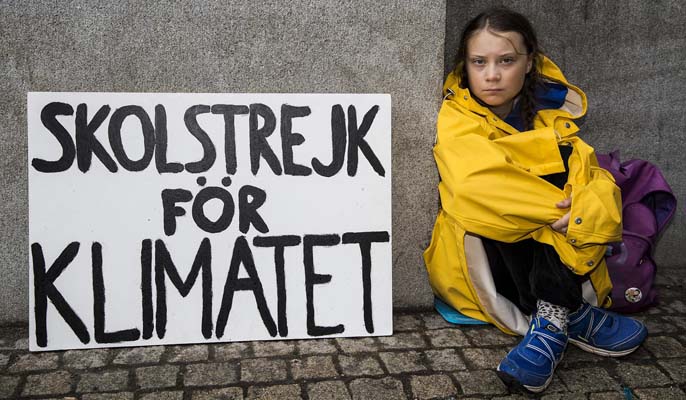
Between Greta Thunberg, Extinction Rebellion and the recent climate strikes, news surrounding environmental activism is everywhere, making everyone more aware of their own impact on the natural world.
People are becoming more conscious of their purchases, making the switch to bamboo toothbrushes and ditching single-use plastic wrapping.
Now, more than ever before, consumers are prioritising the ‘green’ option, capturing the attention of many big brands. Big, global companies are beginning to realise that their carbon footprints will affect how people buy from them. However, instead of companies putting in the work to make their products more environmentally friendly, a disturbing trend called ‘greenwashing’ has emerged, seeing many brands falsely portray their products as eco-friendly.
A recent example of greenwashing can be seen at Boots, who released a statement promising the removal of plastic bags from their stores. Allegedly, this move would take 900 tonnes of plastic out of their supply chain, but in 2019 this switch is nothing radical; many high-street stores have already changed to paper or reusable bags in a bid to cut waste. Consumers quickly saw through Boots’ statement as a positive PR move, readily aware that most of their products come wrapped in plastic after long-haul import journeys. In all, their feeble announcement backfired in a corporate climate which is more than used to seeing entire product lines changed in the interests of reducing global impacts.
Within the beauty industry itself, entire brands designed just to greenwash are becoming increasingly common. Take Love Planet and Beauty as an example, a fairly new skincare brand who cover their packaging with features of the natural world to show off an all-natural, eco-friendly vibe. When beauty bloggers examined Love Planet and Beauty, they discovered that the brand’s face masks are not biodegradable and the packaging is not recyclable. Further still, their ingredients are not organic, so images of grass and flowers aside, there is no evidence that this brand is any more beneficial to the environment than competitors.
So, what can you do? It’s difficult enough trying to make sustainable choices without being misled by brands using rising sea-levels and the bleaching of the coral reefs as marketing tools. Here are my own three personal tips to keep in mind when buying new products to help you avoid being taken in by greenwashing:
1. Do Your Research
Many brands, especially new ones, market their produce on social media. Before clicking “add to cart” on the first bamboo mug you see, have a quick search of the company’s website and look at how they’re supporting their own claims of sustainability.
2. Read the Comments
People are starting to become aware of greenwashing techniques with more ‘eco’ brands popping up on their Instagram feeds every day. Consumers are eager to question brands on their commitment to the environment and you will often find all you need to know here.
3. Ask Your Own Question
Most brands respond to direct questions on social media, and if you don’t want to ask your question in the public domain you can contact them by email before making a purchase. The more consumers question businesses on their environmental practice, the more likely they are to make changes.
Greenwashing can be complicated and sometimes tricky to spot. It’s infuriating to be misled when you, as the consumer, are trying your best to make the right decisions for the environment. By calling out companies for this behaviour and doing our research before committing to a brand, we can reduce the impact of greenwashing and allow the genuine eco-brands to be recognised and supported.






There sometimes can be a lot of misconceptions surrounding the media that organic is better for you where in reality it uses more land therefore more resources are wasted, land and resource use is important to question when it comes to purchasing these product’s, for instance it takes less land and resources to grow plant-based food’s than to grow animal-based food’s, aswell as emmiting less greenhouse gases which poison the Earth, there are many benefits of investing in true green energy, less viruses, less food poverty, happier animals, more forest land for wildlife as less land and resource’s are being used. Microplastics can be a problem for aquatic life and land animals as it causes water pollution, long chain carbon substances are deadly when it comes to keeping Earth a healthy environment for wildlife, Methane for instance is a greenhouse gas, it’s not really visible but extremely flammable. Rethinking the materials used in manufacturing pracices will not only im improve quality of the lives of wild animals or animals used for purpose of consumption but it will also help our own quality of life and the other people whom we share it with. Humanity may become scared at the concept of changing the way they operate as you can only change with funding in the chain of supply and demand, if customers want more ethical sustainable options and are paying for certain products then the supply will change to something that benefits it’s customers on the factor of currency. some of the products I’ve seen are meat products which get away with calling their organic grass grazed beef something along the line’s of sustainable, the reality is that cattle grazing uses more land use therefore more water use and grain use which if the plant’s were fed directly to the human populations you could feed the world imagine all those children, their eye’s lighting up when they see that there’s finally food on the table ☺ all their faces, filled with joy, imagine the clean water and better housing and better pay. No child should go hungry, invest in plants to feed the world.